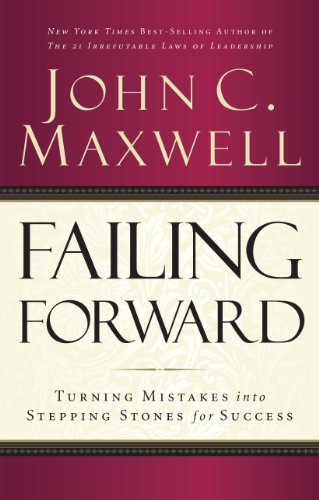
Are some people born to achieve anything they want while others struggle? Call them lucky, blessed, or possessors of the Midas touch. What is the real reason for their success? Is it family background, wealth, greater opportunities, high morals, an easy childhood?
New York Times best-selling author John C. Maxwell has the answer: The difference between average people and achieving people is their perception of and response to failure.
Most people are never prepared to deal with failure. Maxwell says that if you are like him, coming out of school, you feared it, misunderstood it, and ran away from it. But Maxwell has learned to make failure his friend, and he can teach you to do the same.
“I want to help you learn how to confidently look the prospect of failure in the eye and move forward anyway,” says Maxwell. “Because in life, the question is not if you will have problems, but how you are going to deal with them. Stop failing backward and start failing forward!”
The author of 24 books on maximizing personal and leadership potential, John C. Maxwell believes “the difference between average people and achieving people is their perception of and response to failure.” In Failing Forward, he offers inspirational advice for turning the difficulties that inevitably arise in life into stepping stones that help you reach the top. Noting that star performers are often those who aggressively push forward after encountering adversity, Maxwell shows how a variety of well-known and not-so-well-known people have forged ahead despite obstacles that could have derailed them. They include: Mary Kay Ash, who founded her cosmetics firm against enormous odds when the direct-sales company she toiled in for 25 years resisted her continued corporate climb; Truett Cathy, who lost two brothers (and business partners) in an airplane crash and experienced his own serious medical problems before establishing the Chick-fil-A fast-food chain; Greg Horn, who reopened his Kentucky grocery store just 21 days after it suffered $1 million in flood damage; and Beck Weathers, who lost his nose, half of one arm, and the fingers on his other in the infamous 1996 Into Thin Air Mt. Everest tragedy, but now takes a positive message of survival and conquest to audiences around the world. –Howard Rothman

decent stuff here Maxwell is a former minister and the founder of a company that offers support services to religious organizations. As such, his book’s upbeat, you can do it tone may be off-putting to some. But there’s some interesting stuff here and the real life examples he uses of people of have learned from failure provide some good hands-on advice. The book is organized into 15 steps that will help us make the most out of a failure. These are designed to help us ‘fail forward.’ Some of them include: find…
An important nook about an important life issue John Maxwell does a marvellous job of helping people to work through failure and move on. I am 53 years old and was recently laid off by an employer who told me that I was the best employee he had. I felt betrayed and would wake up every morning thinking of ways to get even (even though I knew I wouldn’t act on them.) I was really hurt and couldn’t get over it. A friend of mine suggested I read two books. The first one she recommended was this one and it really helped me to put things into…
Use Setbacks to Overcome Your Stalled Thinking Failing Forward is one of the best stallbusting books I have ever read! It focuses on how to handle our emotions when things aren’t matching up to our expectations. Dr. Maxwell identifies dozens of stalls that delay progress for those who are experiencing setbacks in their lives.While most people see setbacks as a negative, Dr. Maxwell points out that there is an important lesson that we can use to accomplish more in the future. Building on that appropriate and valuable perspective,…